Dewey Decimal System Chart
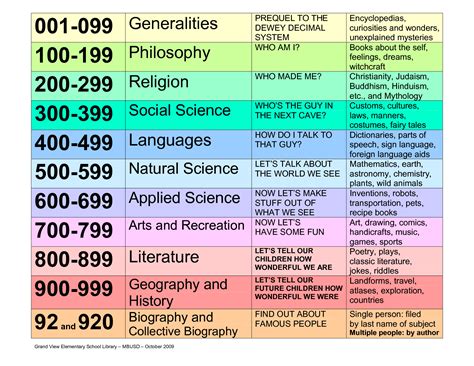
The Dewey Decimal Classification (DDC) system is a widely used library classification system that organizes books and other library resources by subject matter. It was created by Melvil Dewey in 1876 and has since become one of the most popular and flexible systems for libraries worldwide. The DDC system provides a standardized way to arrange materials, making it easier for users to locate and access information.
Understanding the Dewey Decimal System
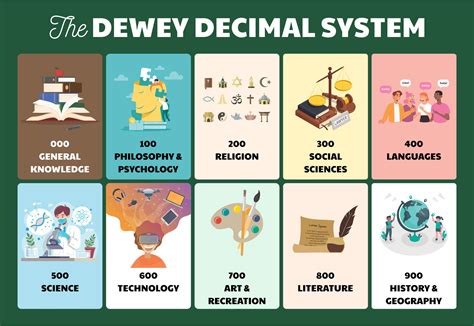
The Dewey Decimal System is based on a hierarchical structure, with each subject area represented by a unique number. These numbers are known as class numbers and are used to classify and arrange materials on library shelves. The system is divided into ten main classes, each covering a broad subject area, and further subdivided into ten divisions and then into more specific categories.
Here's a brief overview of the ten main classes in the Dewey Decimal System:
- 000 - Generalities: This class includes general works, encyclopedias, and books on library and information science.
- 100 - Philosophy and Psychology: Topics covered in this class range from philosophy and ethics to parapsychology and occultism.
- 200 - Religion: This class covers various religions, including Christianity, Islam, and Judaism, as well as mythology and comparative religion.
- 300 - Social Sciences: Here, you'll find books on sociology, politics, economics, and law.
- 400 - Language: This class is dedicated to language and linguistics, including dictionaries, grammars, and literature in various languages.
- 500 - Natural Sciences and Mathematics: From pure sciences like chemistry and physics to applied sciences like medicine and agriculture, this class covers a wide range of scientific disciplines.
- 600 - Technology: This class is all about technology, engineering, and applied sciences, including topics like manufacturing, communications, and transportation.
- 700 - Arts and Recreation: Fine arts, decorative arts, music, sports, and games are some of the subjects covered in this class.
- 800 - Literature: From poetry and drama to prose and literature in various languages, this class celebrates the written word.
- 900 - Geography and History: Books on geography, travel, and history can be found in this class, offering a journey through time and space.
Each of these main classes is further divided into more specific categories, allowing for a detailed organization of library resources. The decimal notation used in the DDC system provides an almost limitless number of class numbers, ensuring that even the most specialized subjects can be accommodated.
How to Use the Dewey Decimal System
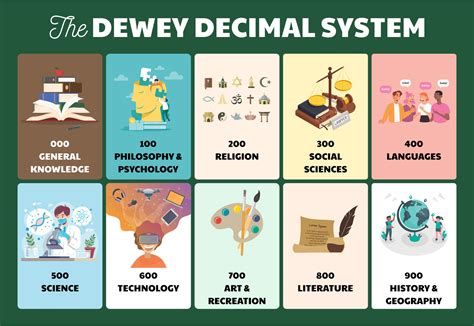
Using the Dewey Decimal System is relatively straightforward once you understand the basic structure. When browsing a library's shelves, you'll notice that books are arranged in numerical order, with each number corresponding to a specific subject area. For example, books with class numbers starting with 500 will be related to natural sciences and mathematics, while those starting with 900 will cover geography and history.
To find a specific book, you'll need to know its class number, which is usually listed in the catalog or on the book's spine. Once you have the class number, you can locate the book on the shelf by following the numerical sequence. It's important to note that the DDC system is flexible, and some libraries may choose to modify or adapt it to better suit their collection and user needs.
Here's a simple step-by-step guide to using the Dewey Decimal System:
- Identify the Subject: Determine the main subject of the book you're looking for.
- Find the Class Number: Look up the class number for the subject in the library's catalog or online.
- Locate the Section: Go to the section of the library that corresponds to the first digit(s) of the class number.
- Follow the Numerical Sequence: Once you're in the right section, follow the numerical order to find the specific class number. Books are usually arranged from left to right and top to bottom.
- Browse Similar Subjects: If you can't find the book you're looking for, try browsing nearby class numbers as related subjects may be shelved together.
By following these steps, you can navigate the Dewey Decimal System with ease and quickly locate the resources you need.
Benefits of the Dewey Decimal System
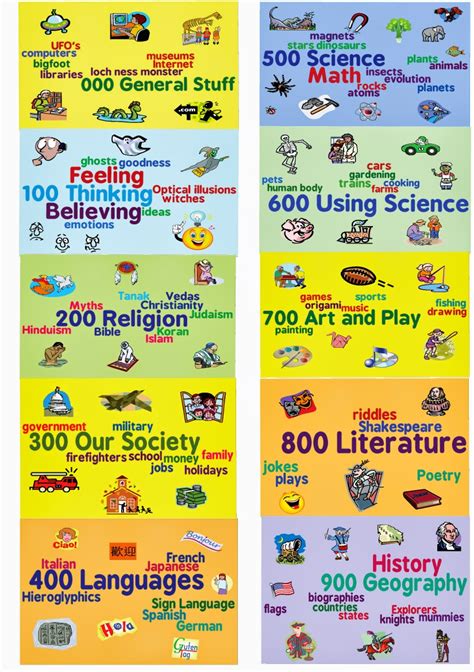
The Dewey Decimal System offers several advantages for libraries and users alike:
- Standardization: The DDC system provides a consistent and standardized way to classify and organize library resources, making it easier for users to locate materials and for libraries to manage their collections.
- Flexibility: With its hierarchical structure and decimal notation, the DDC system can accommodate a vast array of subjects, allowing libraries to classify even the most specialized topics.
- User-Friendly: The numerical organization of the DDC system makes it intuitive and user-friendly, especially for those who are familiar with the system or have a basic understanding of its structure.
- Efficiency: By arranging materials by subject, the DDC system saves time for both library staff and users, as it simplifies the process of locating and retrieving resources.
- Discoverability: The DDC system encourages serendipitous discovery by grouping related subjects together, allowing users to explore and discover new areas of interest while browsing the shelves.
Modifications and Updates
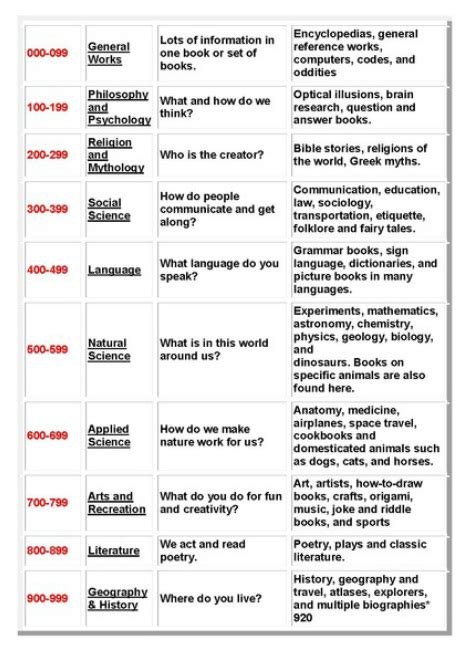
While the Dewey Decimal System has remained largely unchanged since its inception, it has undergone periodic revisions to keep up with the evolving nature of knowledge and technology. These revisions ensure that the system remains relevant and adaptable to the changing needs of libraries and their users.
The most recent edition of the DDC, the 23rd edition, was released in 2011 and introduced several updates and modifications. These changes aimed to improve the system's accuracy, clarity, and coverage of emerging subjects, such as digital technology and environmental sciences.
Here are some key modifications made in the 23rd edition:
- Revised Class 000: The 000 class, which covers generalities, was reorganized to better reflect the changing nature of information and library science.
- Updated Class 300: The 300 class, dedicated to social sciences, received significant updates to accommodate new subjects and trends in the field.
- New Class 621.38: A new class number, 621.38, was introduced to cover the rapidly growing field of robotics.
- Environmental Sciences: The 500 class, covering natural sciences, was expanded to include a more comprehensive treatment of environmental sciences.
These modifications and updates demonstrate the DDC system's commitment to staying current and relevant in an ever-changing information landscape.
The Future of Library Classification
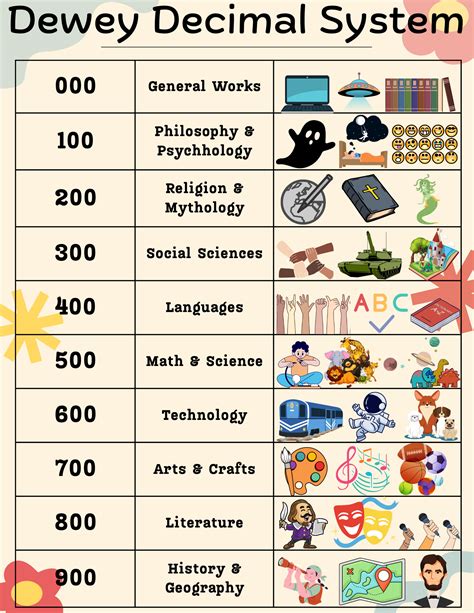
As technology continues to advance and the way we access and consume information evolves, the future of library classification systems, including the Dewey Decimal System, is an intriguing topic of discussion.
While the DDC system has proven its durability and adaptability over the years, some libraries and organizations are exploring alternative classification systems or making modifications to better suit their specific needs. For example, some libraries are experimenting with subject-based classification systems that focus on user-friendly labels and descriptions rather than numerical codes.
Additionally, with the rise of digital libraries and online resources, there is a growing need for classification systems that can effectively organize and retrieve digital content. This has led to the development of metadata standards and controlled vocabularies, which provide a structured way to describe and categorize digital resources.
Despite these developments, the Dewey Decimal System remains a cornerstone of library classification, and its impact on the organization and accessibility of information cannot be overstated. Its flexibility, standardization, and user-friendly nature have made it a trusted system for libraries around the world, and its legacy will continue to shape the way we access and explore knowledge for years to come.
Frequently Asked Questions
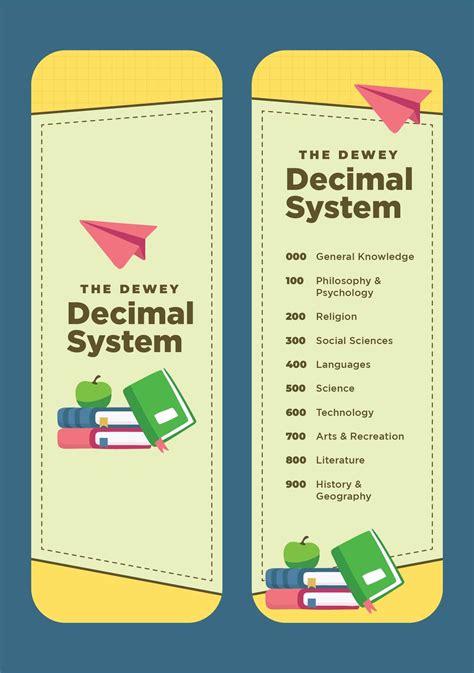
How often is the Dewey Decimal System updated?
+The Dewey Decimal System is periodically updated to reflect changes in knowledge and technology. The most recent major update was the 23rd edition, released in 2011.
Can libraries modify the Dewey Decimal System to suit their needs?
+Yes, libraries have the flexibility to modify the DDC system to better accommodate their unique collections and user needs. This may involve adding or removing class numbers or creating custom schedules for specific subjects.
Is the Dewey Decimal System used worldwide?
+The DDC system is widely used, especially in North America and Europe. However, some countries and libraries prefer alternative classification systems that better suit their cultural and linguistic contexts.
How can I learn more about the Dewey Decimal System?
+You can explore the official website of the Online Computer Library Center (OCLC), which provides extensive resources and information about the DDC system. Additionally, many libraries offer training materials and guides to help users understand and navigate the system.


